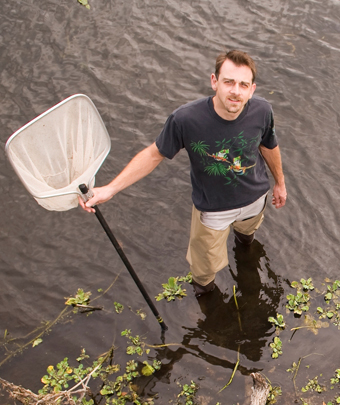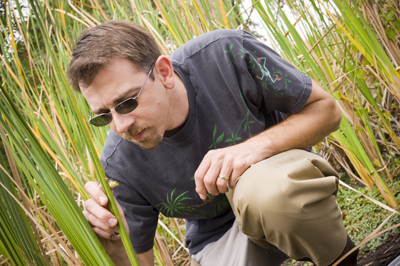Eck Institute for Global Health faculty, Jason Rohr, shares some of his research interests, passions, and hobbies. Rohr is currently the Ludmilla F., Stephen J., and Robert T. Galla College Professor of Biological Sciences as well as the Associate Chair of the Department of Biological Sciences.
Q. Tell us about your research program. How and when did you first become interested in the field?

A. My research program in global health is on finding simultaneous solutions to human schistosomiasis and food, water, and energy shortages in the developing world. Schistosomiasis is a neglected tropical disease caused by a trematode (flatworm) that is transmitted from snails to humans. I became interested in human schistosomiasis after discovering that fertilizer and the herbicide atrazine increased trematode infections in frogs. I wondered whether what I had observed in frogs might be occurring in the human analog. My colleagues and I conducted work in outdoor water-filled tanks and in Senegal and revealed that several agrochemicals were increasing the risk of schistosomiasis through top-down and bottom-up effects on snails. Currently, we are attempting to remove aquatic vegetation, which is snail habitat, from water access points in Senegal to see if it reduces schistosomiasis. This vegetation can be turned into compost and some of it is being used to feed livestock and biodigesters that provide cooking gas.
Q. What is your greatest scientific/research achievement to date? Is there a publication you are most proud of?
A. It is hard to pick one, but I am excited about two papers that were published recently. In 2018, my colleagues and I published a paper in Nature Communications (Halstead et al. 2017) that showed that fertilizer and an herbicide increased schistosomiasis risk by increasing algal food resources for snails and that an insecticide increased schistosomiasis risk by decimating snail predators. In follow-up work in Nature Sustainability (Rohr et al. 2019), we synthesized knowledge on the interactions between emerging human infectious diseases and global food production. I think this latter piece of work could potentially be important to policy and planning decisions as the global human population approaches 11 billion in 2100.
Q. What do you find to be the most rewarding aspect of training students? How has working with students impacted your research?
A. I wouldn’t be where I am today if it weren’t for the enormous number of fantastic graduate and undergraduate students that have come through my laboratory. They are the engine that drives my lab. They also bring me so much joy. I have had so many that have become superstars and will undoubtedly exceed my accomplishments. Seeing my undergraduate and graduate students blossom into autonomous and potent scientists is what I find so rewarding about training students.

Q. What advice would you give your college self?
Think bigger sooner. The work I started doing was a bit narrow in scope and, honestly, a bit esoteric. I wish someone would have encouraged me to think bigger picture sooner in my career.
Q. Tell us a fun fact about yourself, or something you enjoy doing in your free time. What's it like to balance teaching, conducting research, and home life?
A. Before I moved here, I really enjoyed playing soccer. I often played several times a week, and even coached both my daughters’ high school team last year. I hope to find a league to play in when the weather isn’t too cold. Soccer provides me with a healthy escape from work that I can also enjoy with my family.